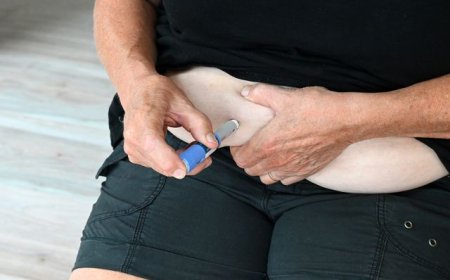PCOS and Mental Health: A Deep Dive into the Emotional Impact of Polycystic Ovary Syndrome
Polycystic Ovary Syndrome (PCOS) is a common hormonal disorder that affects millions of women across the globe.

Polycystic Ovary Syndrome (PCOS) is a common hormonal disorder that affects millions of women across the globe. While it is often associated with physical symptoms such as irregular periods, excessive hair growth, acne, and weight gain, theres another layer to this condition that deserves equal attentionits emotional and mental health impact.
For many women, living with PCOS doesnt just mean managing irregular ovulation or metabolic challenges. It also means navigating complex emotional experiences like anxiety, depression, low self-esteem, and chronic stress. Understanding the psychological effects of PCOS is just as important as treating its physical symptoms.
The Emotional Toll of PCOS: More Than Skin Deep
The link between PCOS and mental health is deeply intertwined. Hormonal imbalancesparticularly elevated levels of androgens (male hormones), insulin resistance, and irregular cortisol productioncan significantly influence mood and emotional stability.
Many women with PCOS report:
-
Frequent mood swings
-
Chronic fatigue and irritability
-
Heightened anxiety or panic episodes
-
Feelings of hopelessness or depression
-
Social isolation and withdrawal
-
Body image issues stemming from acne, hair loss, or weight gain
These are not just fleeting emotions. They can affect relationships, professional lives, self-worth, and overall quality of life.
Why Does PCOS Affect Mental Health?
There are several biological and psychological factors that link PCOS to mental health issues:
1. Hormonal Imbalance
The hormonal dysregulation caused by PCOS can disrupt neurotransmitters in the brain responsible for mood and emotional balance, such as serotonin and dopamine. This biological connection explains why women with PCOS are at higher risk for conditions like depression and anxiety.
2. Insulin Resistance
Insulin resistancea common feature of PCOSnot only contributes to weight gain and fatigue but also impacts the brains ability to regulate emotions. It is closely linked with symptoms of low mood and poor stress tolerance.
3. Physical Symptoms and Body Image
Struggling with unwanted hair growth (hirsutism), severe acne, hair thinning, and persistent weight issues can deeply damage self-confidence. Many women with PCOS report feeling "less feminine" or socially withdrawn due to these appearance-related changes, further intensifying emotional distress.
4. Infertility and Reproductive Concerns
PCOS is a leading cause of infertility, and for women trying to conceive, this reality can create tremendous emotional strain. Feelings of guilt, inadequacy, or grief are not uncommonespecially when faced with repeated disappointments or invasive treatments.
5. Lack of Awareness and Misdiagnosis
Many women with PCOS go undiagnosed for years, enduring frustrating symptoms without clarity. This can lead to emotional burnout, anxiety about the unknown, and a sense of helplessness.
Breaking the Silence: A Holistic Approach to PCOS at Kasmah
At Kasmah, we recognize that PCOS is not just a hormonal disorderits a whole-body condition that impacts mental, emotional, and social well-being. Thats why we take a holistic, integrative approach to treatment, offering more than just conventional medical care.
Heres how we address the emotional and psychological challenges of PCOS:
1. Therapeutic Support
Individual counseling and cognitive behavioral therapy (CBT) can be life-changing for women managing PCOS-related mental health issues. These therapies help address negative thought patterns, manage anxiety, reduce depression, and build resilience in the face of long-term health challenges.
2. Mindfulness and Stress Management
Chronic stress can worsen PCOS symptoms by increasing cortisol levels. Through mindfulness-based stress reduction (MBSR), yoga, guided meditation, and deep-breathing exercises, we empower women to manage daily stress and cultivate emotional calm.
3. Nutritional Counseling and Lifestyle Coaching
A balanced diet and regular physical activity can help regulate insulin, reduce inflammation, and improve hormonal healthall of which are tied to better mental wellness. Our team includes nutritionists and wellness coaches who create personalized plans that are sustainable and empowering.
4. Community and Support Groups
Sometimes, just knowing youre not alone can make all the difference. At Kasmah, we foster peer support groups where women with PCOS can share stories, learn from others, and feel seen, heard, and supported. This sense of community is crucial for emotional healing.
5. Expert-Led Integrated Care
Our specialists understand the full spectrum of PCOSits physical, mental, and emotional aspects. That means you receive comprehensive care that takes into account the entirety of your experience, not just lab reports or symptoms.
Real Stories, Real Struggles, Real Strength
At Kasmah, weve seen countless women transform their lives by addressing PCOS as a whole-person condition. From regaining confidence and joy to restoring mental clarity and inner peace, the stories of resilience we witness every day remind us of one thing: you are not your diagnosis.
Mental health challenges linked to PCOS are valid, treatable, and deserving of compassionate care. Whether youre battling anxiety that won't go away, struggling with how your body looks, or feeling overwhelmed by irregular cycles and weight gainyou are not alone.
What You Can Do Today
If you or someone you know is dealing with PCOS, here are some immediate steps you can take to nurture both physical and emotional well-being:
-
Seek professional support: Dont hesitate to consult a therapist or counselor familiar with PCOS.
-
Get a complete evaluation: A gynecologist or endocrinologist can assess hormonal and metabolic health.
-
Practice daily self-care: Whether its 10 minutes of meditation, journaling, or a mindful walksmall rituals can boost mental clarity.
-
Connect with others: Join a PCOS support community online or offline to share and learn.
-
Be kind to yourself: PCOS is not your fault. You deserve compassion and understanding on your journey to health.
Final Thoughts
PCOS is not just a reproductive or metabolic disorderit has profound effects on a womans emotional world. The journey can be overwhelming at times, but with the right care, mindset, and support, it is entirely possible to reclaim your well-being and joy.
At Kasmah, were committed to helping you heal not only your body but also your mind and spirit. Because true health is holisticand you deserve nothing less.
Lets break the silence around PCOS and mental health. Lets talk, heal, and growtogether.









































